Edgar Wright Talks the Long Road to ‘Scott Pilgrim Takes Off’ and the Key to Franchise Storytelling

When filmmakers suffer disappointments at the box office, they often take comfort in other theatrical flops that still stood the test of time, such as Blade Runner and The Shawshank Redemption. Edgar Wright’s Scott Pilgrim vs. the World now has the surprisingly good fortune of being one of those examples. In the summer of 2010, despite significant buzz and rapturous responses from sneak previews at San Diego Comic-Con, the inventive and engaging action-comedy based on Bryan Lee O’Malley’s graphic novels opened to just $10.6 million en route to a disheartening $49.2 million.
But even before the end of that calendar year, Wright could sense that a cult audience had already developed through specialty screenings and the rare DVD press tour for a box office failure. He then felt that word of mouth grow even more over the years, and it soon proved itself in tangible form, as merchandise and additional home releases kept getting made.
More from The Hollywood Reporter
'Scott Pilgrim Takes Off' Review: Netflix's Animated Adaptation Charms Despite Flaws
'Scott Pilgrim Takes Off' Trailer Teases a Colorful Anime Take on the Battle of the Exes Tale
David McCallum, Star of 'The Man From U.N.C.L.E.' and 'NCIS,' Dies at 90
Five years ago, Marc Platt Productions contacted Wright to see if he’d like to continue the franchise in some way, shape or form, but he quickly shot down any talk of a live-action sequel.
“In 2018, Jared LeBoff from Marc Platt Productions called me and said, ‘So, is there anything more to be done with Scott Pilgrim?’” Wright tells The Hollywood Reporter. “And I think I finished his sentence and said, ‘That isn’t an expensive live-action sequel.’ And I said, ‘People keep asking if the rest of the books are going to be adapted, so why not do an anime of the books?’”
However, much to Wright’s surprise, O’Malley wasn’t too keen on just adapting his previous works. Instead, he got together with his friend and eventual co-showrunner, BenDavid Grabinski, to crack the story that is now known as Scott Pilgrim Takes Off. Out of deference to the eight-episode anime series’ many surprises, it’s best to provide as little plot description as possible, but it’s safe to say that Scott Pilgrim Takes Off begins in a familiar place before it makes a giant left turn.
“The key to doing a continuation of something or any kind of franchise film is to give people what they need, not what they want. And the problem with a lot of franchises is when they give people what they want, but the public doesn’t actually want that,” Wright says. “So that’s when fan service starts to go wrong … I’ve resisted it myself when people wanted to expand or sequelize things that we’ve done, especially with the Cornetto films.”
Besides being one of the most celebrated filmmakers of his generation, Wright is beloved by his peers, and is often asked to either host Q&As with other filmmakers or provide notes on early cuts of their films. In the latter category, Wright has long been a part of Christopher McQuarrie’s inner circle whenever initial feedback is needed on his Tom Cruise-led films, such as Mission: Impossible — Fallout, Top Gun: Maverick and most recently, Mission: Impossible — Dead Reckoning.
“I’m very grateful that they sometimes include me in that process,” Wright says. “I think I watched Dead Reckoning’s assemble edit with no score on it, and even though it was a full hour longer than what was released [at 2 hours and 43 minutes], I have to say that it was never less than very entertaining. So then it’s more a case of, ‘OK, what do you want to do?’”
Below, during a recent conversation with THR, Wright also discusses the Scott Pilgrim cast email thread that’s remained active since 2010 and how painless it was to get the original cast to reprise their roles for Takes Off.
Well, if it isn’t “Edgar Wrong” … [Writer’s Note: If you’ve yet to watch Scott Pilgrim Takes Off and want to preserve the experience, Edgar’s first two answers reference a joke and small character without much context.]
(Laughs.) What’s funny about that is Bryan [Lee O’Malley] texted me and pitched “Edgar Left.” And I said, “It should be Edgar Wrong.” Edgar Left and Edgar Wrong were two very easy nicknames at school, so I was happy to have provided both of those names, based on things that I’d been called.
Did you quickly shut down any talk of you voicing that character?
I was never asked, actually. He does look like me, but he has the voice of Kevin McDonald from Kids in the Hall. And because I’m a big Kids in the Hall fan, I was very flattered that he was the person playing me.
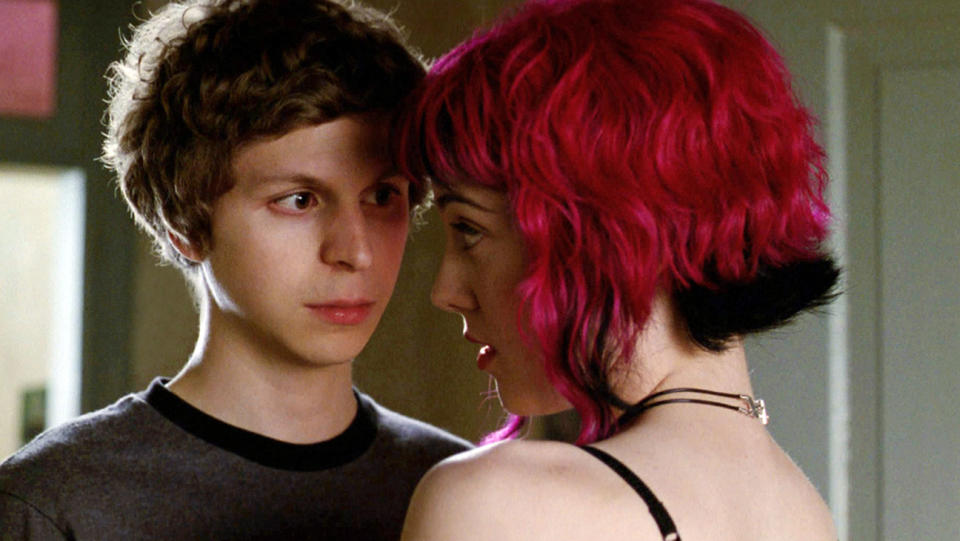
So we’ve talked before about how Scott Pilgrim vs. the World taught you that box office should never define the legacy of a film, and now you have an anime series to further back up that position.
Well, you tell yourself those things so you don’t have utter despair at the time. (Laughs.)
Has the feeling you had on Aug. 16, 2010, the Monday after release, officially faded?
I remember that time vividly. Sometimes, if a film doesn’t do well, everybody involved runs for the hills and never speaks to it ever again, but that didn’t happen with Scott Pilgrim, because I was that proud of the movie. I knew the cast were really proud of it, and I knew that the people at the studio who worked on it were really proud of it. So it was more a case of, “This is going to take longer than 72 hours to get the word out and find its audience.” Obviously, when you’re on the receiving end of it, it is very dispiriting, but in the back of your mind, countless films that you love didn’t do well on their initial release.
Today, when you tell younger people that Blade Runner or The Thing didn’t do that well when they came out, they’re like, “Oh, really? Wow.” Big Trouble in Little China didn’t even make the top 10 when it came out. So there’s enough of those movies, like The Big Lebowski, where you can’t write their epitaph on the Monday morning after release. They live on in different ways. Obviously, as a producer-director, you have a responsibility, but at the same time, I was like, “I can’t promote this anymore. I can’t do any more interviews for it,” so I knew that I worked my ass off. You just have to take it on the chin and accept that this film is unconventional enough to general audiences and it’s going to take longer to find its audience.
And over the years, it’s been very pleasing to see things change. Even by the end of 2010, it was starting to play midnights at cinemas in Los Angeles. The New Beverly and The Nuart, and other cinemas around the country as well, were programming that film. So you could see that something was happening, and crucially, the cast showed up for it, as well. When the DVD came out in November, we did a very unusual DVD press tour, and we did Q&As with some of the cast. And I guess that’s unheard of for a film that hasn’t done well. So it continued to play in theaters over the years.
Even if it’s not in the black, you are aware that it’s become part of the catalog of the studio because they are exploiting it. (Laughs.) There were several Blu-ray releases, there’s a new soundtrack and there are T-shirts, mugs, action figures and Funko Pops. It just keeps on going and going and going. And the cast and I had obviously seen each other a lot over the years. We’ve also had this group email from 2010 that’s still going to this day, and we reunited a couple of times for Q&As and a 10th anniversary charity live read.
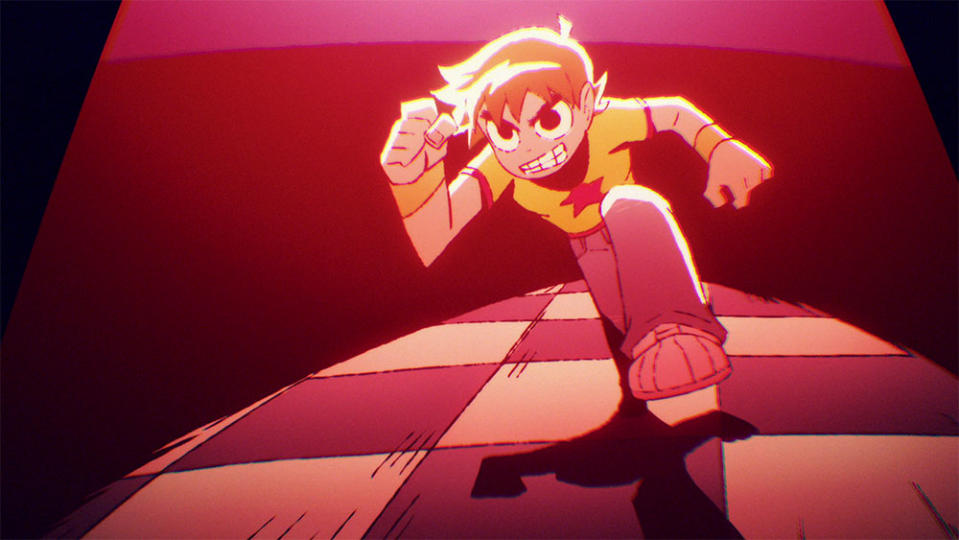
How did the anime series begin to materialize?
In 2018, Jared LeBoff from Marc Platt Productions called me and said, “So, is there anything more to be done with Scott Pilgrim?” And I think I finished his sentence and said, “That isn’t an expensive live-action sequel.” And he said, “Yeah.” Fans who like the film don’t really know or care how it did, so people always say, “Sequel. When?” And I’ll say, “Oh, probably never.” But sometimes, as a deflection, I’ll say, “Well, that’s up to Bryan Lee [O’Malley]. It’s his character, his books and his universe.” And so I said that as a deflection over the years, but then it became real. Jared asked me the question, “What could we do?” And I said, “Well, maybe animation. People keep asking if the rest of the books are going to be adapted, so why not do an anime of the books?”
So that became a conversation with Bryan and Netflix, and everybody was very keen. But the thing that was a surprise to me as well is that Bryan didn’t really have any interest in just revisiting the books from 20 years ago. He wanted to do something fresh with it. So he went away and brainstormed, and over the course of one long dinner with his friend BenDavid Grabinski, who’s a big fan of the books and the film, they brainstormed the treatment for what the show is. So they came back to me, Jared, Adam [Siegel] and Nira [Park] and said, “Here’s what we think the show could be.” I thought, “Oh wow. This is interesting.” So they went away and wrote it, and we didn’t approach the cast until it had the green light from Netflix.
When we first started talking about it, it was 2018, but I don’t think I actually emailed the cast about it until early 2022, which is kind of wild. But, by this time, they had written the eight scripts. So it wasn’t a case of talking to the cast in a hypothetical way: “Would you be interested in doing something more?” It was like, “We have something and we can’t wait for you to read it.” So I wrote an email to the same 2010 chain, saying, “Bryan and BenDavid have come up with something really interesting. It has a green light. We would love you to be involved, obviously, and I can’t wait to see what you think.”
Within about three hours, everybody replied, which was amazing. So it is really beautiful in a way. It’s rare that you have the opportunity to continue something, but in a way that feels really authentic, as in Bryan Lee O’Malley, the creator of the comics, is the co-creator and co-showrunner. Without that, I don’t think the cast would be involved, and I don’t know if I would be involved. Because he had a new idea of how to continue that was exciting to everybody.
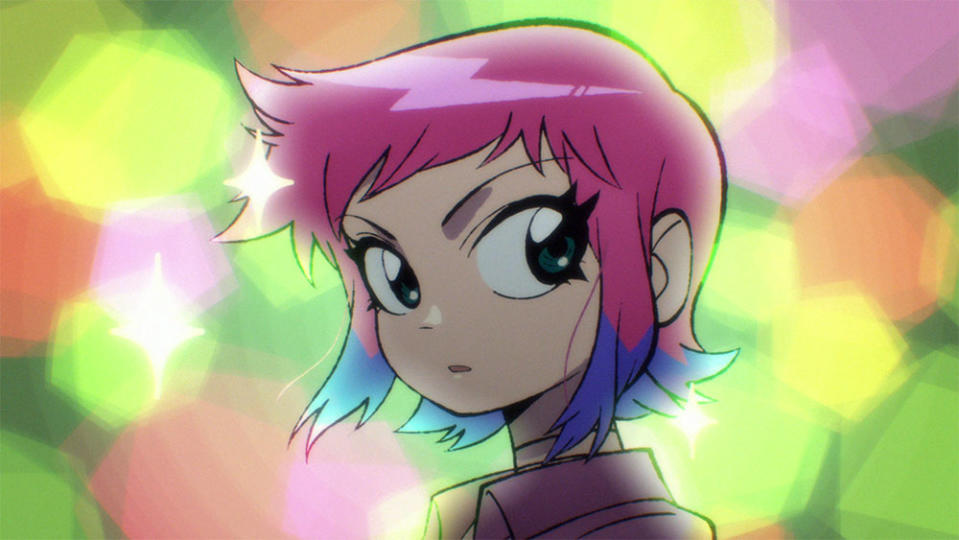
See, I assumed you first gauged the cast’s interest during that 10th anniversary live read, but that’s obviously not the case, despite having them all on one Zoom meeting.
Yeah, we didn’t want to go in with a hypothetical question. We wanted to go in with a real proposition of, “We have a green light, we have scripts and we would love you to be involved.” I think I wrote a very nice email to them with the subject heading: “Scott Pilgrim to Be Continued?”
They all have healthy careers now, but did you expect the superheroes with Captain-related monikers to be the toughest gets?
Not when Chris Evans replies within 20 minutes, no. (Laughs.) It’s a testament to everybody having such a fun time on that movie and remaining friends. They’re like a family, and that doesn’t always happen. So people have stayed in touch and seen each other. I’ve seen most, if not all, of the cast over the years, and we’ve always talked about doing other things together. The funny group email would sometimes be turned into a competition of who could be the most deadpan and sarcastic, and it was usually between Michael Cera and Kieran Culkin. (Laughs.) It was also a group email that wasn’t necessarily about anything serious until we did that charity readthrough or did this. Usually, it was sharing memes and snarky stuff with each other, which was just funny.
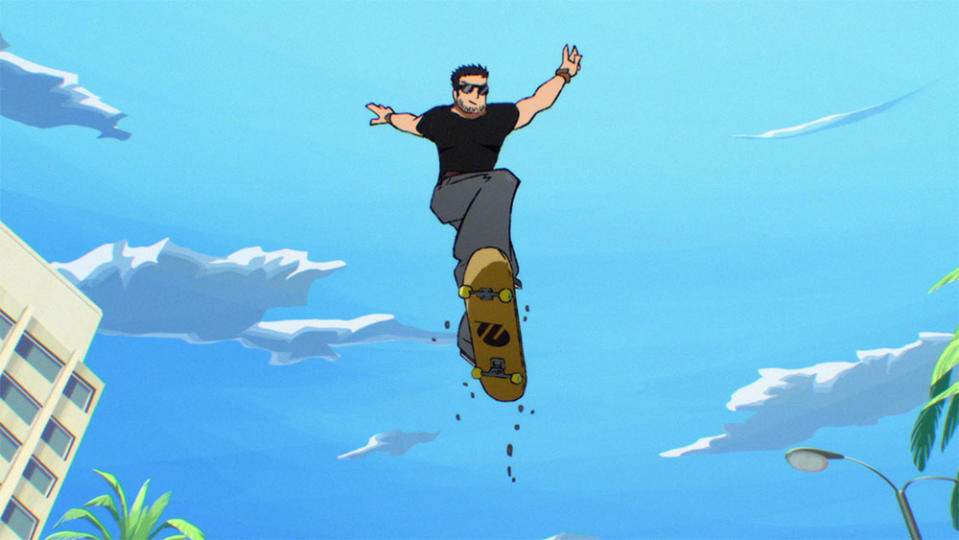
Scott Pilgrim Takes Off is one of, if not the first, times you’ve overseen a project where other people are doing the day-to-day creative work in a sandbox that partially belongs to you. And you obviously know what it’s like to be a writer-director in somebody else’s sandbox, as well. So, what was that role reversal like for you?
Bryan Lee O’Malley was doing it, and if he wasn’t involved for whatever reason, then it would be a whole other thing. But really, as an executive producer, I’m there to facilitate what he wants to do. Whatever he wants to do with the character, I’m excited, and I want to see what that is. The work by Science Saru in Japan is just mind-blowing, and if anything, I feel relieved that I’m not doing it because it’s so much work. (Laughs.) When I watched the 2010 film last year or the year before when it was rereleased, me and [DP] Bill Pope watched it in London and did a Q&A. And when you watch back films that you’ve made, you’re always like, “How did we do that? I don’t even understand how we did that.” Thinking about the making of it just exhausts you.
So, to sit back and read the scripts that were coming in one by one was a total pleasure, and they were so funny and so well thought-out with amazing lines. My notes on the scripts would be very few, and credit to Bryan and BenDavid, as there were very little changes to the scripts before they started getting made. And then, with the cast all over the world and in different time zones, it was making sure that I was there to at least make them feel welcome and text them, saying, “Hey, I’m here. If there’s anything, you can text me.” So it was just about being protective of them, because they’re coming back and they’re doing it for the love of the show.
Watching the cuts come in as Science Saru started to weave their magic, it was just a very surreal but pleasurable thing of getting a link once or twice a week. Seeing this animated show get more and more finished felt like Christmas, and that goes for hearing the voices of the original actors replace the temp stuff that had been put down. Suddenly hearing Mary do Ramona again was really magical. All of them were.
So I enjoyed the [role reversal], but it would be different if it was something that me and Simon [Pegg] had originated. These were Bryan’s books, and he is the co-showrunner. So I would text him and be like, “Are you happy? Is everything good? Let me know if there’s anything. I just want to make sure that you are cool with everything that’s happening,” which he was. So I was protective of the cast and protective of him in terms of making sure that everybody’s happy with what they’re doing. So it was a pleasure, to be honest. I can’t think of anything that I’ve worked on where there were so few notes on the scripts and on the animation and everything. It was pretty incredible.
You mentioned that co-showrunner BenDavid Grabinski is a massive fan of the property, and while it worked out very well in this case, how important was it to have a superfan alongside Bryan? I used to think that franchises needed to hire megafans, but then Tony Gilroy completely blew up that notion with Andor.
That was Bryan’s suggestion. Weirdly enough, the first time I probably ever met BenDavid was at a New Beverly screening of Scott Pilgrim. So I knew he was a big fan, and I think he’d even been at one of the test screenings of the film. I didn’t know that at the time, because I’d usually be cowering and terrified in the back. But that was Bryan’s suggestion. They’re friends. Bryan says himself that BenDavid helped him brainstorm what the idea would be and how you could take it further. And that’s great.
The key to doing a continuation of something or any kind of franchise film is to give people what they need, not what they want. And the problem with a lot of franchises is when they give people what they want, but the public doesn’t actually want that. (Laughs.) So that’s when fan service starts to go wrong, because you’re giving them the simplest version of it rather than doing anything different with it. I’ve resisted it myself when people wanted to expand or sequelize things that we’ve done, especially with the Cornetto films.
I’ve seen the fans say, “We want this, we want this.” And then, when it comes out, they’re like, “Oh no, we don’t like this. Oh God.” So you’ve always got to do something you want to do and not because you think you ought to do it. That’s advice I give to young filmmakers, and that’s basically what Bryan thought of with Scott Pilgrim Takes Off. I assumed, wrongly, that he might want to do a straight adaptation of the books, but he wanted to do something different. And when he came up with that something different, it was then a reason to be excited. We weren’t doing something that was expected; we were doing something that was surprising.
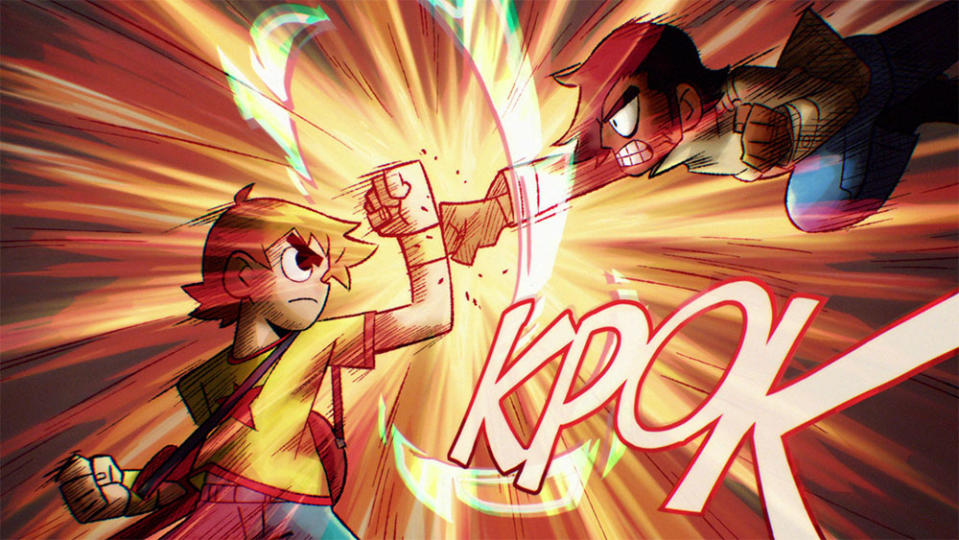
Were you able to include any material in the series that you didn’t have room for in the film?
Fans usually want every single scene that’s in the books. So they’d be like, “Where’s the fight in the library? Where’s Knives’ dad? Where’s the Honest Ed scene?” And I’d be like, “I did as best I could, and it’s a miracle that we even have that.” (Laughs.) So I was always in that vein, and I think people don’t quite understand. Even at the time, some fans would be like, “Why didn’t you just do six movies?” And I would think, “I felt like we were lucky to do one.” I don’t mean to sound fatalistic, like I went into Scott Pilgrim thinking that there wouldn’t be a second one, but it’s always presumptuous when movies tease a sequel that never happens. (Laughs.) You never want to be one of those films. And it’s funny when there are ones, like The Golden Compass, or Divergent.
Yeah, the fourth and final Divergent film never got made.
I always liked the end of Flash Gordon, because it says “The End.” But then Ming’s hand comes back and takes the ring, and you see the question mark appear, so it reads “The End?” which is cool. But then you remember they didn’t make another one and think, “Yeah, that was it.” (Laughs.)
I was going to ask you earlier if you were ever worried about “director jail” on the heels of Scott Pilgrim’s box office, but you ended up on the World’s End set within a couple years. That movie just had its 10th anniversary, too. Anyway, did the reception of Scott Pilgrim affect you at all during World’s End?
It’s a difficult question to answer. Maybe director jail is something that’s partly in your mind. You feel like you’ve been a bad boy and you’re in trouble, but everybody at the studio knew that I couldn’t have worked any harder on making and promoting Scott Pilgrim. So the way it played out was the way it played out, and ultimately, World’s End was also made by Universal. So that’s a difficult question to answer, and that’s more for other people to say than me. I couldn’t really give you the macro view of it. When you’re in that situation, you’re just thankful to have another chance to make a movie, and I feel like that with every film. I always make every film thinking it might be my last, because nobody knows what’s going to happen to the business. Nobody knows what’s going to happen to the world. And so I hope I never am ungrateful about making movies.
Directing films is also a weird thing. It’s a strange job where you get to do your job infrequently, maybe once every three years or four years. There’s a lot of writing and developing and gearing up to do something, so it’s strange. I envy people like Steven Soderbergh, who somehow retired and has still made more movies since his retirement than I have in my career. (Laughs.) So I don’t know how he does it, and I wish I had that special sauce. I’d love to make more movies more frequently, but it takes an emotional and physical toll on you every time you make one. There’s a period of the bends and depressurizing, on top of how well the last one did. So I don’t really know how to answer that question, but it’s definitely something where you feel very grateful whenever you get to make a film again.
Lastly, as you may or may not recall, I’m fascinated by Edgar Wright’s Test Screening Services, which often benefit the work of Chris McQuarrie, Tom Cruise and Eddie Hamilton. And that trend continued on Dead Reckoning, right?
Yeah, when I do my own test screenings for family and friends, they’re always the toughest ones. You are going to the people who are going to tell you like it is, and sometimes, you don’t want to hear it. They’re giving you the tough love about something. But what I find interesting about their process is that they’re real perfectionists, and it’s just amazing to see how those films come together, from Fallout and Top Gun: Maverick to Dead Reckoning. So I find it fascinating, and I’m very grateful that they sometimes include me in that process. I think I watched Dead Reckoning’s assemble edit with no score on it, and even though it was a full hour longer than what was released [at 2 hours and 43 minutes], I have to say that it was never less than very entertaining. So then it’s more a case of, “OK, what do you want to do?” So when there is an opportunity to do that, it’s great.
When you show something to other filmmakers, it’s different from a test screening because they’ll be able to vocalize it in a practical way. A test screening will react in a sort of binary way, which is also good. When you do test screenings, sometimes the cards are not as important as the feeling in the room, and what works and what doesn’t work. Do people understand things? Are things too long or too short? I’ve never done a film where I haven’t test screened it, and they’re always incredibly nerve-wracking. But when it goes great, there is nothing better.
I can only think of two of my films where the first test screening was a knockout, and I’ve had other ones where, “OK, we need to do a lot of work.” On Scott Pilgrim, we did five test screenings, and each time the number went up, which was great. If the number had gone down, I probably would’ve been locked out of the edit. So it’s an interesting and nerve-wracking process to go through, but showing it to other filmmakers is a little easier, even if they’ll sometimes tell you what you don’t want to hear.
The only reason I asked about the Mission stuff is because those guys are so open about their process. You’ve even told me before that your Mission: Impossible — Fallout note was something they didn’t want to hear, but it seems like your sound-related suggestion for the Entity served them well in the end.
Yeah, and Chris has already probably talked about all of these things. I, too, am always amazed how he lays open the process. He does long podcasts with Light the Fuse and Empire, and it’s really interesting for fans and filmmakers. I’m one of the few people who still tries to do DVD extras, because, for a lot of people, those extras are film school for people who don’t go to film school. I didn’t go to film school. Little things in DVD extras are the way you learn. The making of John Carpenter’s The Fog has a really interesting thing in it where they made the movie and it wasn’t working. And then they basically did two days of reshoots, and in those two days, they pretty much shot every memorable shot in the movie. And I thought, “OK, wow, this is amazing.” And once they show you what the inserts are that elevated the film, it was a real eye-opener as a director. You understand what you can achieve in the edit and how one close-up can change the entire movie. So I always find that stuff fascinating.
***
Scott Pilgrim Takes Off is now streaming on Netflix.
Best of The Hollywood Reporter

 Yahoo News
Yahoo News 
